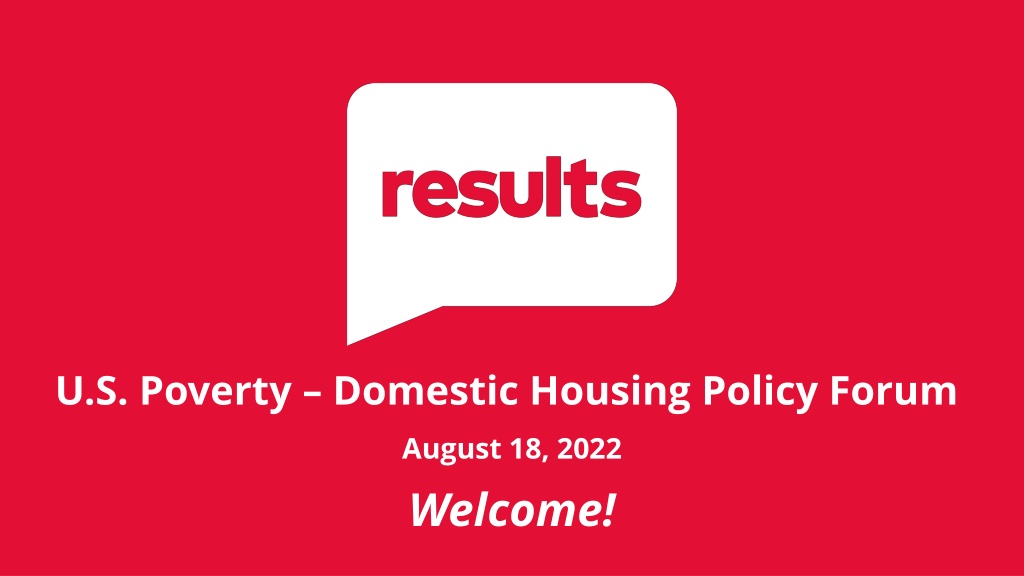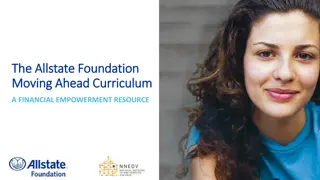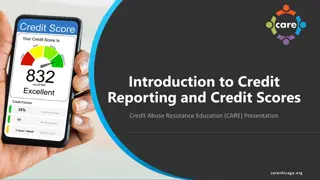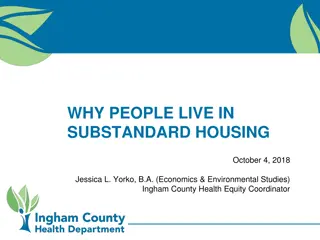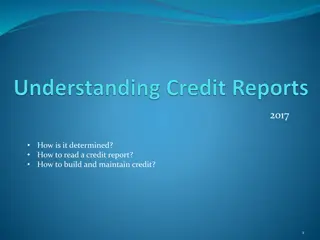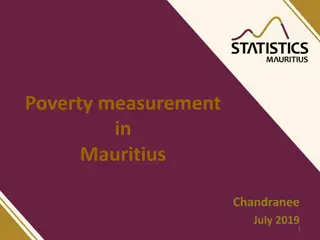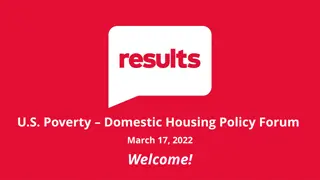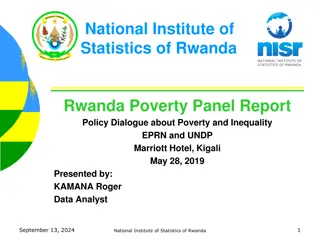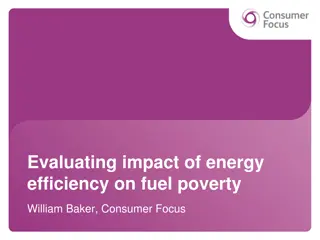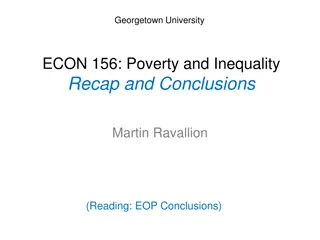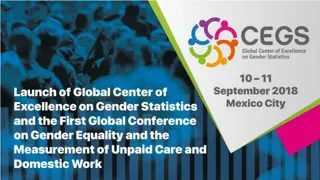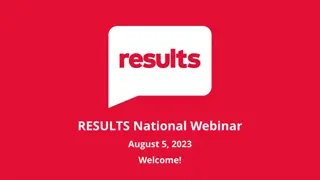U.S. Poverty & Housing Policy Forum: Renters Tax Credit Overview
The U.S. Poverty & Domestic Housing Policy Forum held on August 18, 2022, focused on advocating for tax code reform to provide fully-refundable tax credits to tenants, aiming to address housing affordability issues. The forum emphasized anti-oppression values and the importance of including diverse voices in the fight against poverty. It highlighted the need for progressive tax policies that benefit renters who are often left behind, facing high rent costs and housing instability. By advocating for a renters' tax credit, the forum aimed to achieve economic, housing, racial, and disability justice.
Download Presentation

Please find below an Image/Link to download the presentation.
The content on the website is provided AS IS for your information and personal use only. It may not be sold, licensed, or shared on other websites without obtaining consent from the author. Download presentation by click this link. If you encounter any issues during the download, it is possible that the publisher has removed the file from their server.
E N D
Presentation Transcript
U.S. Poverty Domestic Housing Policy Forum August 18, 2022 Welcome!
3 RESULTS Anti-Oppression Values RESULTS is a movement of passionate, committed everyday people. Together we use our voices to influence political decisions that will bring an end to poverty. Poverty cannot end as long as oppression exists. We commit to opposing all forms of oppression, including racism, classism, colonialism, white saviorism, sexism, homophobia, transphobia, ableism, xenophobia, and religious discrimination. At RESULTS we pledge to create space for all voices, including those of us who are currently experiencing poverty. We will address oppressive behavior in our interactions, families, communities, work, and world. Our strength is rooted in our diversity of experiences, not in our assumptions. With unearned privilege comes the responsibility to act so the burden to educate and change doesn t fall solely on those experiencing oppression. When we miss the mark on our values, we will acknowledge our mistake, seek forgiveness, learn, and work together as a community to pursue equity. There are no saviors only partners, advocates, and allies. We agree to help make the RESULTS movement a respectful, inclusive space. Find all our anti-oppression resources at: https://results.org/volunteers/anti-oppression/
5 What We Want Reform/Amend Internal Revenue Code ( tax code ) oFully-refundable tax credit to tenants (not landlords) oPeriodic payments (monthly)
6 Why Tax Code Reform? Tax code should be more progressive, people-centered Aligns our housing and tax asks; strengthens tax code advocacy Using tax code to provide housing assistance provides more relief for more people
7 Why Renters? Renters are left behind by existing tax code High rent costs are a severe burden on low- income households o Wages are not rising with rent costs o Compete with spending on other needs Housing instability, evictions, homelessness
8 Why Renter's Tax Credit? Broadly benefits households that aren't served by existing programs Adds to our toolbelt of addressing housing unaffordability no quick fix, no single fix Makes tax code more equitable Achieves economic justice = housing justice, racial justice, disability justice
9 Background: Refundable versus Non-Refundable A refundable tax credit is how you get a tax refund. If your tax credit is larger than the amount of taxes you owe, you receive a refund for the difference. o If you owe $300 in taxes and receive a $500 credit, you will receive the remaining $200. If this credit was non-refundable, you would not receive the remaining $200.
10 Background: Credit versus Deduction Credit: reduction in the amount of taxes you owe o If you owe $500 in taxes at the end of the year and receive a $300 credit, your amount owed goes down to $200. Deduction: reduction in the amount of income that can be taxed o Around 90% of tax filers opt for standard deduction ($12,550 for single filers, $25,100 for couples filing jointly) o Typically only beneficial to people with higher incomes
11 What Credit Could Look Like Credit could be universal payment or based on the relationship between rent paid and income (just one idea for structure) o Credit amount = rent paid - 30% of income Credit could have caps on amount of credit or on income
12 Elements of RTC Eligibility Income requirements/caps Age, (dis)ability, geographical area Delivery Landlord or tenant? Periodic or annually? Required Documents Lease, rent receipts, proof of residency Amount Calculation Universal payment or relationship between income, rent payment, and/or local fair market rent o o o o o o
13 State-Level Renter s Tax Credits 23 states currently offer some type of renter s tax credit or deduction o Deductions: IN, MA, NJ o Non-Refundable Credits: AZ, CA, HI, MD, MI, MO, RI, UT o Categorical Eligibility (only for elderly and/or disabled): AZ, CO, CT, IA, MO, MT, NM, ND, PA, RI, UT o Others have refundable credits, but often they are not enough: CA: $60, HI: $50 o Noteworthy states: MN, DC o Two states recently introduced legislation: KY, NE
14 State-Level Renter s Tax Credits State can provide us with ideas for how to frame advocacy o A lifeline for seniors Utah o Rent relief Rhode Island o Racial justice issue Minnesota o Matter of fairness for renters California o Pro-family, pro children and young people, pro- housing choice
15 Bipartisanship Seeing support for state-level renter s tax credits from BOTH Democrats and Republicans o Bipartisan bills in state legislature to expand and increase credits in CA, MN, and MO o Republican support for programs that use categorical eligibility (CA, CT, MN, MT) Main source of contention will likely be cost, work requirements
16 Next Steps? RESULTS s housing/tax campaign work broadly focuses on achieving economic justice through a more progressive, equitable tax code that benefits and prioritizes low-income renters, families, children, young people especially those unable to get housing assistance. At RESULTS, we believe that the federal tax system can do a better job of addressing the affordable housing and homelessness crisis. We are working on a long-term, multi-year housing campaign via a renter s tax credit that builds upon the successes of the expanded advance monthly Child Tax Credit in lifting children and families out of poverty, targeting a broader population of beneficiaries.
17 Next Steps? A renters tax credit would cap out-of-pocket rent and utilities expenses, so that low-income families can afford a safe place to live without sacrificing other basic needs. The campaign centers the voices, expertise, and lived experiences of our grassroots while advancing policies that broadly benefit households that existing federal housing and homelessness programs are unable to serve. Short-term, we support policies that increase the supply of affordable housing.
18 Next Steps on Policy Ensuring adequate funding for IRS Simplifying tax code Continuing CTC/EITC advocacy Ensuring IRS data collection on race, ethnicity, and gender
19 What s ahead? Policy Forum (Aug) o Laser Talks + Backgrounder + Leave Behind National Webinar (Sept) o Economic justice Fellow + EOP retreat (Oct) o Listening session + designing a campaign
@RESULTS_Tweets /RESULTSEdFund www.results.org @voices4results
